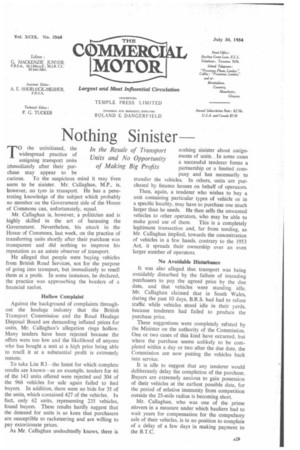Nothing Sinister
Page 31

If you've noticed an error in this article please click here to report it so we can fix it.
TO the uninitiated, the widespread practice of assigning transport units iihmediately after their purchase may appear to be curious. To the suspicious mind it may iven seem to be sinister. Mr. Callaghan, M.P., is, however, no tyro in transport. He has a penetrating knowledge of the subject which probably no member on the Government side of the House of Commons can, unfortunately, equal.
Mr. Callaghan is, however, a politician and is highly skilled in the art of harassing the Government. Nevertheless, his attack in the House of Commons, last week, on the practice of transferring units shortly after their purchase was transparent and did nothing to improve his reputation as an astute observer of transport. He alleged that people were buying vehicles from British Road Services, not for the purpose a going into transport, but immediately to resell them at a profit. In some instances, he declared, the practice was approaching the borders of a financial racket.
Hollow Complaint Against the background of complaints throughout the haulage industry that the British Transport Commission and the Road Haulage Disposal Board are demanding inflated prices for units, Mr. Callaghan's allegation rings hollow. Many tenders have been rejected because the offers were too low and the likelihood of anyone who has bought a unit at a high price being able to resell it at a substantial profit is extremely remote.
To take List R3—the latest for which complete results are known—as an example, tenders for 46 of the 143 units offered were rejected and 304 of the 966 vehicles for sale again failed to find buyers. In addition, there were no bids for 35 of the units, which contained 427 of the vehicles. In fact, only 62 units, representing 235 vehicles, found buyers. These results hardly suggest that the demand for units is so keen that purchasers are susceptible to racketeering and are willing to pay extortionate prices.
As Mr. Callaghan undoubtedly knows, there is nothing sinister about assignments of units. , In some cases a successful tenderer forms a partnership or a limited company and has necessarily to transfer the vehicles. In others, units are purchased by finance houses on behalf of operators.
Then, again, a tenderer who wishes to buy a unit containing particular types of vehicle or in a specific locality, may have to purchase one much larger than he needs. He then sells the unwanted vehicles to other operators, who may be able to make good use of them. This is a completely legitimate transaction and, far from tending, as Mr. Callaghan implied, towards the concentration of vehicles in a few hands, contrary to the 1953 Act, it spreads their ownership over an even larger number of operators.
No Avoidable Disturbance It was also alleged that transport was being avoidably disturbed by the failure of intending purchasers to pay the agreed price by the due date, and that vehicles were standing idle. Mr. Callaghan claimed that in South Wales, during the past 10 days, B.R.S. had had to refuse traffic while vehicles stood idle in their yards, because tenderers had failed to produce the purchase price.
These suggestions were completely refuted by the Minister on the authority of the Commission. One or two cases of this kind have occurred, but where the purchase seems unlikely to be completed within a day or two after the due date, the Commission are now putting the vehicles back into service.
It is idle to suggest that any tenderer would deliberately delay the completion of the purchase. Buyers are extremely anxious to gain possession of their vehicles at the earliest possible date, for the period of relative immunity from competition outside the 25-mile radius is becoming short.
Mr. Callaghan, who was one of the prime niovers in a measure under which hauliers had to wait years for compensation for the compulsory sale of their vehicles, is in no position to complain of a delay of a few days in making payment to the B.T.C.




















































































